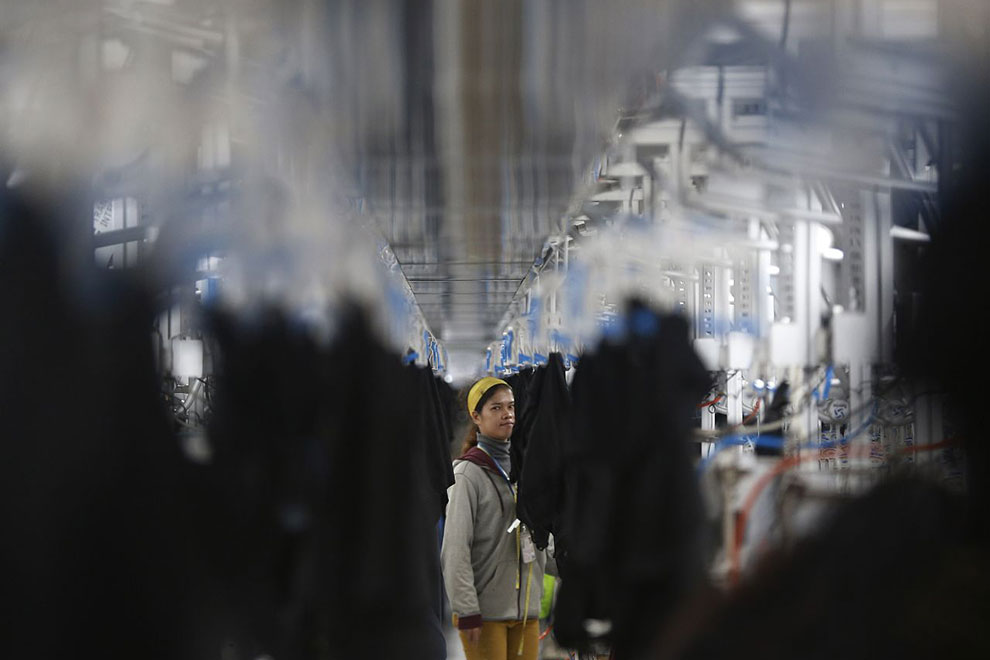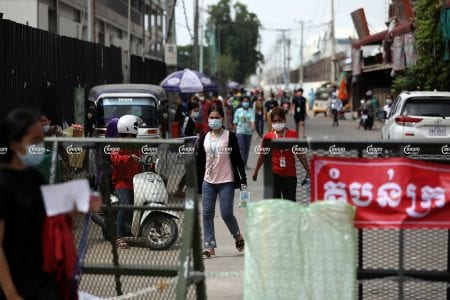Both workers and employers in the garment sector are feeling the pinch in response to last week’s announcement of an $8 rise in the sector’s minimum wage for next year.
But while unions and workers said the lower-than-average wage rise was a sign already of the dampening effects of the possibility of losing duty-free trade with the EU over human rights concerns, an employers’ association said the raise was enough amid heightening regional competition and that governmental policies would make up for any potential trade loss.
“It’s a 4.3 percent wage increase, and compared to the inflation rate of 3 percent, it is acceptable,” said Ken Loo, secretary-general of the Garment Manufacturers Association in Cambodia.
The minimum wage had risen 28 percent over the past five years to the new mark of $190 a month, an increase he said was “quite big.”
However, the same figures were used by workers and unions to point to a slowdown in the sector, with Cambodian Labor Confederation president Ath Thorn saying the recently announced raise was “not fair” considering rising living costs.
He said the EU’s potential suspension of the Everything But Arms (EBA) scheme — a final decision for which is due in February — was already taking its toll.
“The main reason for the new minimum wage increase of $8 for next year, of 4.3 percent, is the EBA sanction. The employers can make excuses that they can’t afford [a higher raise] because of the EBA withdrawal,” Thorn said. “It’s not fair for the workers as [the cost of] goods in the market is increasing and inflation itself is already over 3 percent. Considering the cost of other expenses increasing, there’s no balance.”
Duong Tola, a 39-year-old factory worker and union representative for Kandal province’s E Garment factory, said he was disappointed by the $8 increase.
“Compared to the last few years, when the wage increased between $12 and $13 at least, this year is only $8,” Tola said.
“In the meantime, rents will increase and potentially [the cost of] utilities could also increase,” he said. Tola said he was not sure the wage hike could keep up with inflation.
The low wage rise was compounded by the removal of six public holidays next year, which he said will cost workers about $8 per lost holiday due to lack of overtime pay.
In October last year, European Commission trade commissioner Cecilia Malmstrom explained the EU’s reasoning for considering a suspension of the EBA, pointing out several failures by the Cambodian government to uphold rights and that the country had “gone backwards.”
“We are seeing very troubling developments with a clear deterioration of human rights and labour rights, without convincing improvements in sight,” she wrote. “Our recent EU mission to the country demonstrated serious and systemic violations of, for instance, freedom of expression, labour rights and freedom of association. This comes on top of longstanding issues as regards workers’ rights and land-grabbing.”
Furthermore, last year’s national election was “marked by harassment and intimidation, as well as severe restrictions when it comes to essential political rights,” she said.
Loo, the employers’ representative, downplayed the significance of the potential loss in duty-free access, despite the EU being Cambodia’s biggest export market.
“The EBA withdrawal is not a big threat for the new wage next year, as the Cambodian government will find some solutions to help employers continue to do business in Cambodia,” he said.
“Of course, different employers have different situations, and some of them could face a big challenge to pay higher wages, but some still be fine,” he said.
Loo added that complaints over the removal of six public holidays were misguided, and they were in fact not enough compared to regional neighbors.
“Our competitors in the region have a lot fewer public holidays, so we plan to request the government to cut more in order to compete,” he said.














